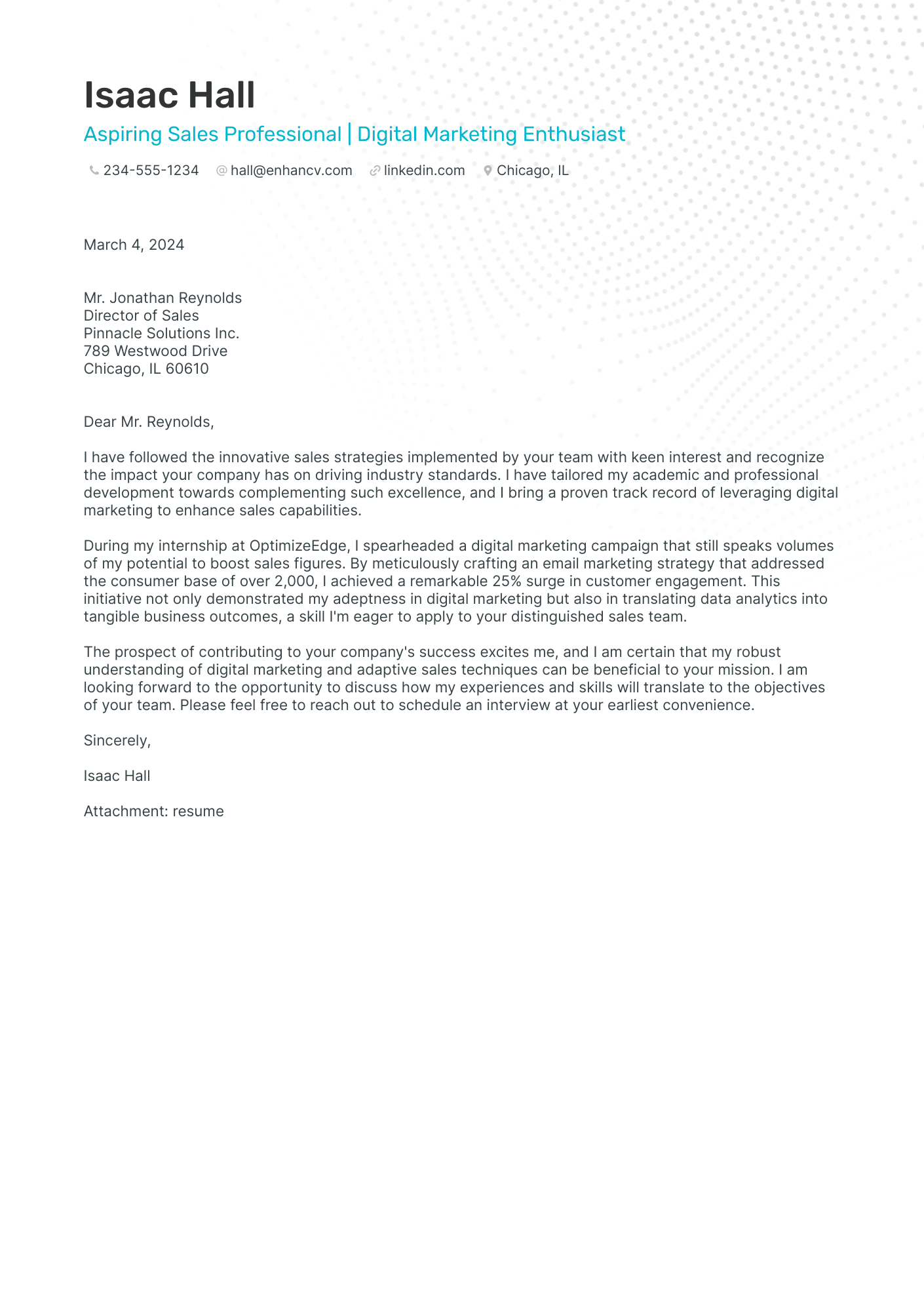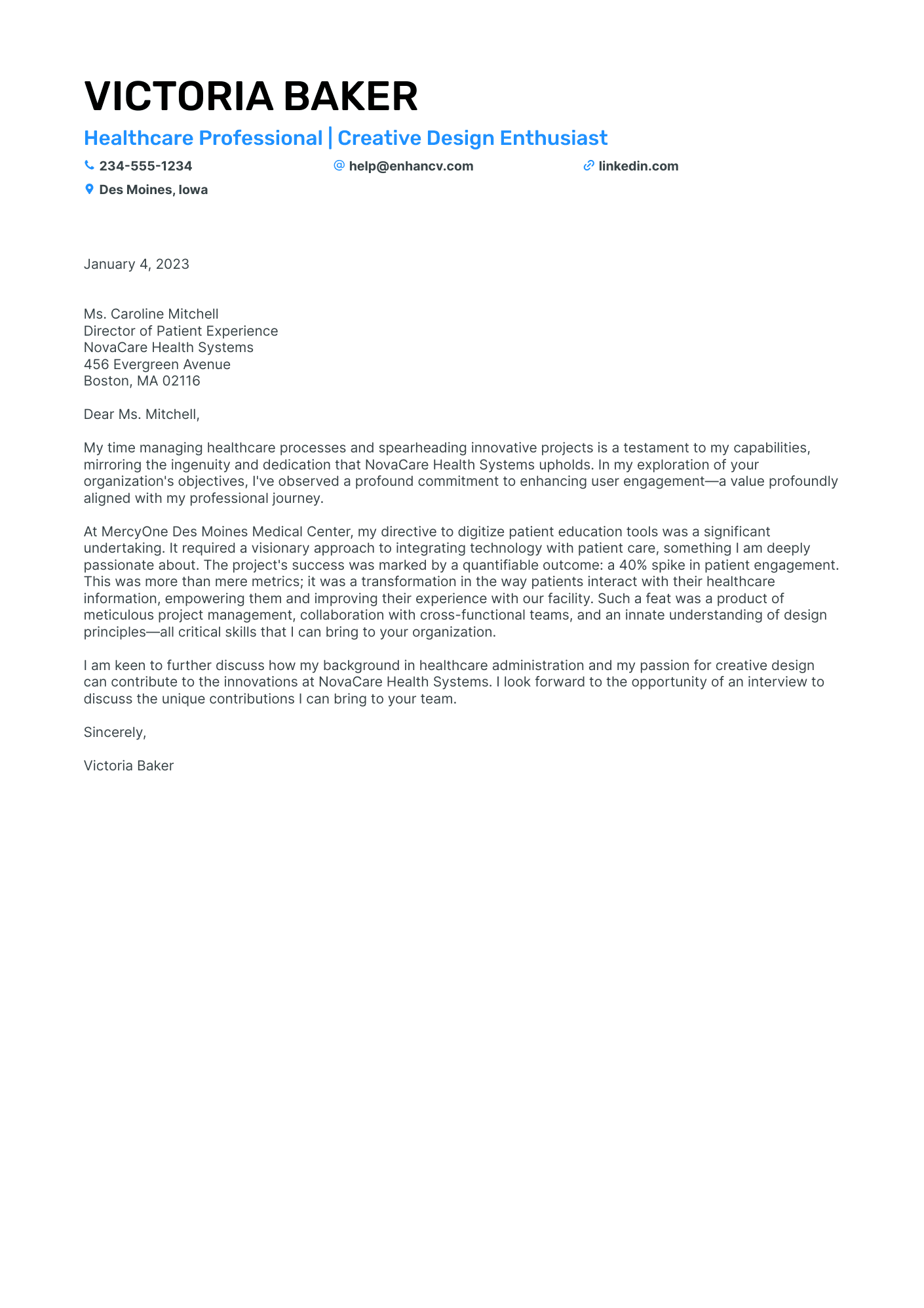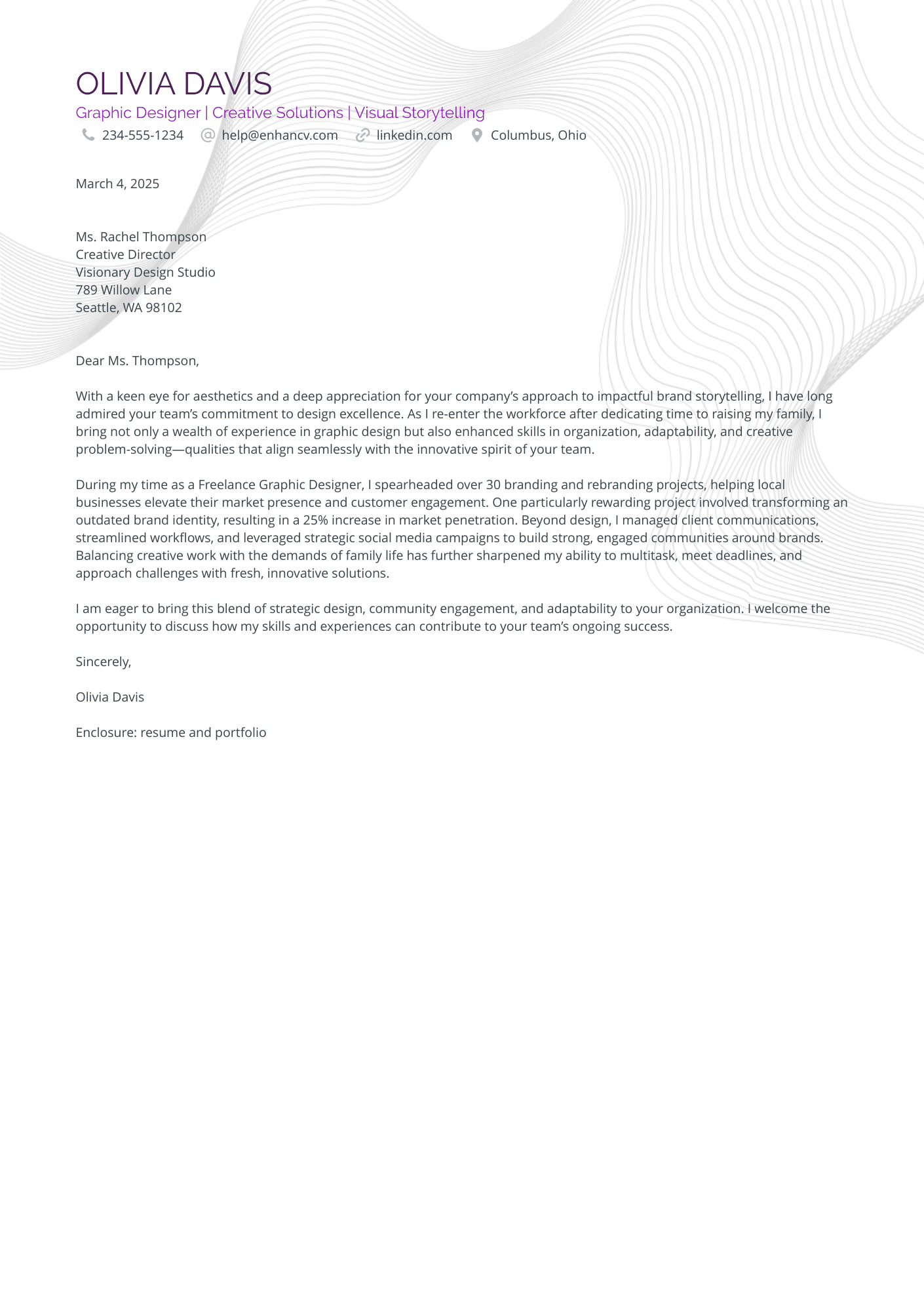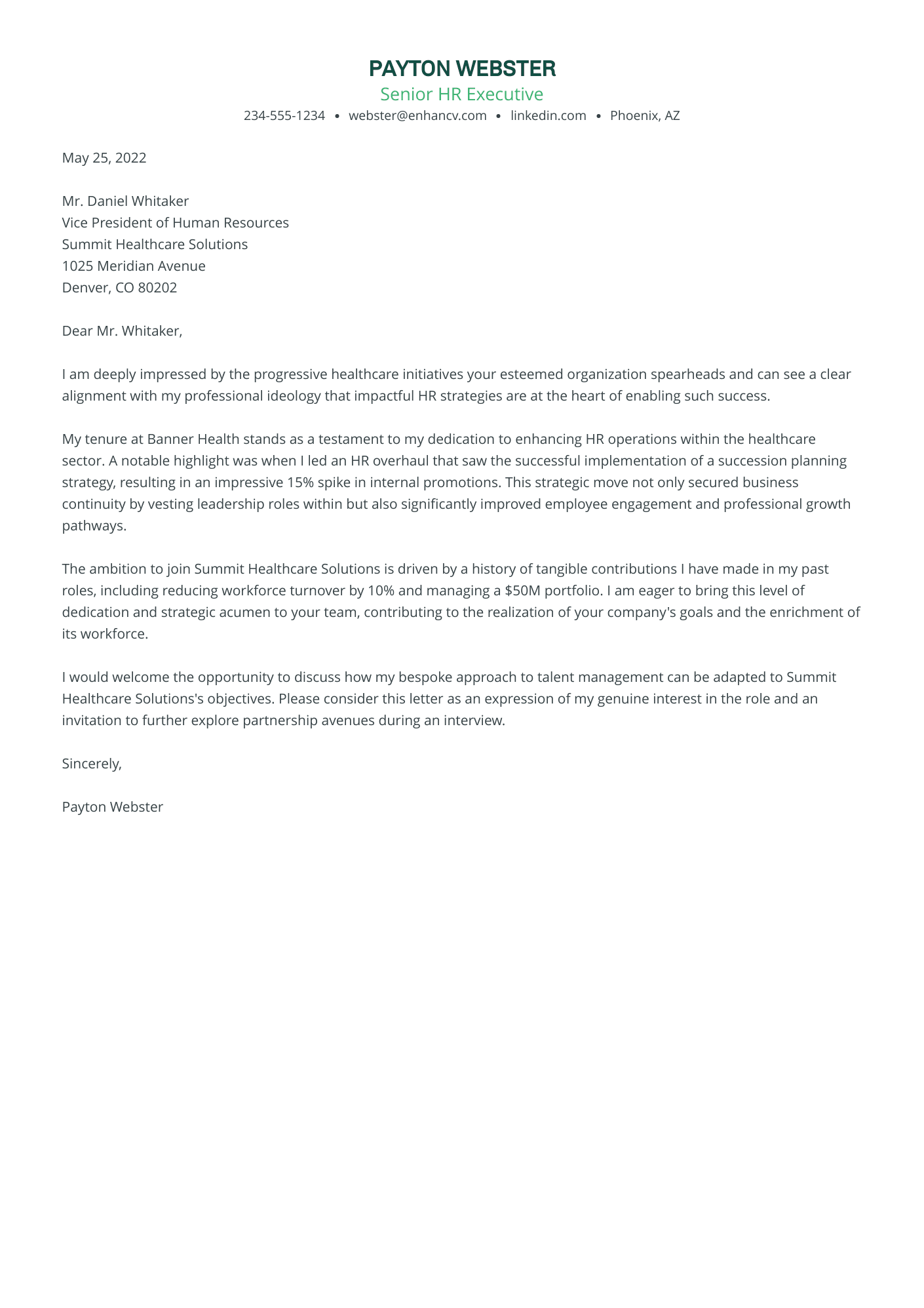A cover letter is your chance to show employers why you're the right fit for the job—but only if it’s done right. The key is following a clear structure while articulating your value in a way that grabs attention. This balance is often the hardest part: how do you stand out as a top candidate without straying from professional norms?
The answer lies in knowing exactly what to include in your cover letter. From crafting a strong opening to highlighting your most relevant skills and closing with impact—each section of your cover letter has a purpose.
Here’s how to structure it and make every word count.
Key takeaways
- Header: Write your full name, job title, phone number, email, LinkedIn, and location.
- Date and inside address: Don’t skip these elements of formal business communication.
- Salutation: Address the hiring manager by name whenever possible for a personal touch.
- Introduction: Draw the reader in by stating the role you’re applying for and why you’re interested.
- Body: Emphasize your most relevant achievements, transferable skills, and how they align with the company’s goals.
- Closing: Reiterate your enthusiasm, invite further discussion, and thank the addressee for their time.
- Sign-off: Use a professional closing like “Sincerely” or “Best regards,” followed by your full name and "Enclosure: Resume."
Before you start putting together the different parts of your cover letter, it’s important to establish a strong foundation. The guidelines below will help you identify who your audience is and what they’re looking for in an ideal candidate.
Beyond structure: Personalizing your cover letter
Knowing what to put in your cover letter must go beyond the basics. Above all, it needs to align with the organization, the role, and even the hiring manager if possible.
This extra effort communicates genuine interest and a thoughtful understanding of what the company is looking for. The more personalized the content, the better your chances of getting an interview call.
Always tailor your cover letter to reflect the company's specific needs and values—this is what sets you apart as a top candidate. To do this effectively, include keywords from the job description in both your resume and cover letter. This not only reinforces your alignment with the role but also demonstrates that you understand and speak the employer’s language.
Should the cover letter and the resume feature the same information?
Keep in mind that a cover letter works together with your resume, but they’re not interchangeable. Both should emphasize your most relevant skills and achievements, but the approach differs.
Your resume presents the facts—job titles, dates, accomplishments—in a structured, scannable format. A cover letter, on the other hand, gives you space to tell the story behind those facts. It’s an opportunity to explain how your experiences connect to the role and spotlight qualities that don’t fit neatly into a resume.
PRO TIP
A word of caution: your cover letter shouldn’t just repeat what’s on your resume. Instead, expand on your career highlights, provide context, and give a sense of your personality. It’s your chance to show how you’ll bring value to this specific role—not every job you’ve ever held.
Ready to build a professional cover letter for a job? Make sure you incorporate the key components below.
Key sections to include in a cover letter
Each section of your cover letter serves a distinct purpose, and understanding how to approach it is essential to creating a compelling narrative.
Header
The header is the first thing a hiring manager notices, often before even glancing at your resume. While there’s no universal agreement on which document gets read first, many recruiters are likely to open your cover letter first because it’s shorter (around 200-300 words) and offers a quick glimpse into who you are.
One rule of thumb to always keep in mind: make your cover letter header identical to your resume’s. Consistency matters.
Thus, your contact information should follow the same order as it appears on your resume:
- Your full name
- Job title
- Phone number and professional email address
- Link to your website or LinkedIn profile
- City and state
Below the header, make sure to include these two elements:
Date and inside address
The devil’s in the details, and aligning your cover letter with standard business correspondence requirements is a simple way to show professionalism. To help you feel confident, we’ve designed our guidelines to align with the standards set by the Professional Association of Résumé Writers and Career Coaches (PARWC).
Start by adding the date two or three lines below the header, using the month-day-year format. Then, another two or three lines down (ideally using consistent spacing), include the address of the person you’re contacting. Whenever possible, address it to a specific individual.
The inside address format should look like this:
- Addressee’s name
- Addressee’s job title
- Company name
- Company physical address
- City, state, postal code
Formal greeting
Two lines below the inside address, add a formal salutation to begin your cover letter. It’s important to avoid being generic here—take the time to research the company and the hiring manager’s name before applying. Personalizing your salutation shows initiative and demonstrates that you’ve done your homework.
Best practices for salutations
- When you know the name: Use “Dear Mr./Ms. [Last Name].”
- When you don’t know the name: Use “Dear Hiring Manager” or a relevant job title (e.g., “Dear Marketing Director”).
- What to avoid: Impersonal salutations like “To Whom It May Concern” or “Dear Sir or Madam” should be skipped, as they come across as outdated and detached.
- Punctuation: Follow the salutation with a comma or colon.
Now that the header, date, inside address, and salutation are in place, it’s time to focus on the core of your cover letter—the body.
Introduction
Think of the opening paragraph as your opportunity to grab the hiring manager’s attention and set the tone for the rest of your letter.
What to include in a cover letter opening
- A strong hook: Capture the hiring manager's attention with a compelling statement or a personalized touch, such as a connection to the company or a shared value.
- Position and purpose: Clearly state the role you’re applying for and express enthusiasm for the opportunity.
- Relevance: Write about a key achievement, skill, or unique qualification that aligns directly with the job and sets the tone for the rest of the letter.
- Personalization: Mention something specific about the company, its mission, or its goals to show that you’ve done your research and are genuinely interested in the organization.
- Professional tone and brevity: Keep the paragraph concise (no more than two sentences), professional, and focused.
Here’s an example of an intro paragraph in a school counselor cover letter:
As a dedicated and compassionate school counselor with a proven track record of supporting students' academic, personal, and career development, I am excited to apply for the School Counselor position at Broward County Public School. Your commitment to providing a comprehensive and developmentally appropriate counseling program resonates deeply with my professional philosophy, as I strive to create supportive environments where all students can thrive.
With that foundation laid, transition smoothly into the body paragraphs, where you’ll delve deeper into your qualifications, accomplishments, and how they meet the company’s needs.
Body section
The body of your cover letter is the heart of your message. It’s your chance to underscore your biggest assets in a way that resonates with the hiring manager while adding depth to your application.
What to include in the cover letter body
- Highlight your top achievements: Share your most relevant accomplishments, but avoid rehashing your resume. Reword them to underscore the impact you’ve made, ideally with quantifiable results.
- Emphasize your human side: Show the qualities that make you a great fit beyond your technical skills. Mention your empathy, adaptability, or ability to connect with diverse groups of people.
- Use the space thoughtfully: If you have employment gaps, career transitions, or significant volunteer experience, use the page to frame them positively.
- Connect to the role and company: Tie your skills and background directly to the job and the organization’s mission. Demonstrate that you understand their goals and explain how you’ll contribute to achieving them.
For better readability, you can break the body into two smaller paragraphs or incorporate bullet points to draw attention to your achievements.
Here’s how it’s done in the school counselor example:
In my previous role as a school counselor, I developed a wellness program that reduced disciplinary incidents by 25% while improving students’ coping skills. I also introduced a peer mentorship initiative that enhanced leadership and collaboration, strengthening the school community and boosting college readiness.
These experiences reflect my dedication to promoting student success both inside and outside the classroom, aligning perfectly with Broward County Public School’s mission.
Closing
A strong closing paragraph leaves a lasting impression and encourages further communication. Some job seekers use it to mention their availability for an interview, preferred salary, or work mode.
However, only include this information if it’s explicitly requested in the job posting. If not, omit it to avoid appearing presumptuous or misaligned with the employer's process.
How to end a cover letter
- Reiterate your enthusiasm: Express your excitement for the role and the opportunity to contribute to the organization.
- Summarize your value: Briefly reinforce why you’re a great fit for the position, connecting your skills and experiences to the company’s goals.
- Include a call to action: Politely suggest the next step, such as arranging an interview, and provide your contact details for convenience.
- Show gratitude: Thank the hiring manager for their time and consideration.
Here’s how:
I am excited about the opportunity to contribute to Broward County Public School and would welcome the chance to discuss how my skills and experiences align with your needs. Thank you for your time and consideration, and I look forward to the opportunity to speak further about how I can support your team.
A well-crafted closing leaves the door open for future discussions while maintaining respect for the employer’s preferences.
Now, the only thing left to consider is the sign-off.
Complimentary closing
Before typing your name, close your letter with a professional sign-off, such as “Sincerely.” Two or three lines below it, add your full name.
You can also write “Enclosure: Resume” or “Attachment: Resume” two lines below your name to prompt the reader to review your resume. This small detail ensures they don’t overlook the accompanying document.
Here’s an example of how our school counselor might sign off their letter:
Sincerely,
Elizabeth Jackman
Enclosure: Resume
Other acceptable sign-offs include:
- Best regards
- Yours truly
- Respectfully
- Kind regards
- With appreciation
Ready to put these tips into action? Use our cover letter generator to craft a polished, professional letter tailored to your dream job in just minutes.
What NOT to include in a cover letter
A cover letter is your opportunity to shine, but adding the wrong information can distract from your qualifications or even hurt your chances. To make the best impression, avoid these common pitfalls:
Cover letter red flags
- Irrelevant personal details: Omit your age, marital status, religion, or unrelated hobbies. Employers are interested in your professional qualifications, not your personal life.
- Regurgitation of your resume: Avoid including unnecessary information that doesn’t relate to the position. Keep your letter focused and concise.
- Generic language: Avoid clichés such as “team player” or “hard worker” unless backed by specific examples. Generic salutations like “Dear Hiring Manager” can also feel impersonal when a name is available.
- Negativity about past employers: Criticizing previous workplaces or colleagues reflects poorly on your professionalism and attitude.
- Unrealistic salary demands: Unless the job posting explicitly asks for your salary expectations, leave this information out of your cover letter.
- Spelling and grammar errors: Typos can undermine your credibility and attention to detail. Proofread carefully or use tools to catch errors.
- Unprofessional header: Double-check that your email address and phone number are correct and up to date.
- Too much flattery: While it’s great to show enthusiasm, overdoing compliments about the company or hiring manager can come across as insincere.
- Unnecessary attachments: Stick to the documents and file format requested in the job posting. Extra materials may clutter the application process.
Now that we’ve broken down the essential components of a strong cover letter, let’s see how they come together in real-world situations.
Cover letter examples for different scenarios
Whether you’re an experienced professional, a recent graduate, or transitioning careers, the same fundamental structure applies—but with strategic adjustments to emphasize your unique strengths.
In the following examples, we’ll demonstrate how different career situations can shape the way you craft your cover letter.
Cover letter for job seekers with no experience
If you’re a student, intern, or entry-level candidate with little to no professional experience, a cover letter is your chance to de-emphasize this deficit. Prioritize transferable skills gained through education, volunteer work, or personal projects.
Key elements to include in your no-experience cover letter:
- Academic achievements: Showcase relevant coursework, research, or school projects that align with the job.
- Extracurricular activities: Leadership roles in clubs, sports teams, or student organizations can demonstrate teamwork, responsibility, and problem-solving skills.
- Volunteer work or internships: Any hands-on experience, even unpaid, can illustrate your ability to contribute in a professional setting.
- Soft skills: Mention communication, organization, and adaptability—qualities employers value in entry-level hires.
Cover letter for career changers
Transitioning to a new field? A well-crafted cover letter can help bridge the gap between your past experience and your new career goals. Instead of focusing on job titles, focus on industry-relevant achievements and your motivation for making the switch.
What to include in your cover letter for a career change:
- Transferable skills: Identify core competencies from your previous roles that apply to the new sector (think project management, communication, problem-solving).
- Relevant experiences: Mention any certifications, coursework, volunteer work, or side projects that demonstrate your commitment to the new industry.
- The why behind your transition: Briefly explain your career shift in a positive light, focusing on what excites you about the change and how your background makes you a strong candidate.
- Tangible impact: Showcase quantifiable achievements from your past work that illustrate your ability to drive results, even in a different field.
This cover letter format is ideal for professionals switching industries, re-entering the workforce, or moving from self-employment to a corporate role.
Cover letter for stay-at-home parents returning to work
For stay-at-home moms and dads, re-joining the workforce can feel challenging, but a well-structured cover letter helps underscore your skills, experience, and readiness to return.
When crafting it, consider the following:
- A confident and positive tone: Frame your return as a valuable step forward rather than focusing on the time away.
- Transferable skills: Spotlight organization, time management, and multitasking—qualities honed while managing a household, childcare, or other responsibilities.
- Relevant experience: If you volunteered, managed a community project, took courses, or freelanced, underline how these experiences kept your skills sharp.
- Clear enthusiasm for returning: Express genuine excitement about resuming your career and how your experience aligns with the role.
Cover letter for executives
For senior-level professionals, a cover letter should convey leadership, strategic impact, and vision. Hiring managers and decision-makers expect a compelling, results-driven letter highlighting business achievements and leadership philosophy.
Key details to include in cover letters for executives:
- Strong opening with an executive presence: Start with a bold statement about your leadership style, core strengths, or top achievements.
- Strategic impact: Showcase high-level quantifiable contributions such as revenue growth, market expansion, cost reduction, or operational improvements.
- Vision: Demonstrate how you drive teams, shape company culture, and create long-term value.
- Industry expertise: Show deep knowledge of industry trends, innovations, and challenges, positioning yourself as a forward-thinking professional.
- Tailored company alignment: Make a strong connection between your executive experience and the company’s goals, ensuring your skills match their vision.
This cover letter style is ideal for C-suite executives, directors, and senior managers aiming for leadership roles.
Frequently asked questions on cover letter structure
Crafting a strong cover letter means understanding your audience and presenting your strengths within a clear, professional framework. The Q&A below will help fill in any gaps and guarantee your letter hits the mark.
What should I include in an email cover letter?
An email cover letter (or e-note) follows a short, scannable format that’s easy to read on any device. It’s much more concise than a traditional cover letter, usually just a few short paragraphs or bullet points.
Here’s what to consider:
- A clear subject line: Something simple like: “Application for [Job Title] – [Your Name].”
- A professional salutation: Use “Dear [Hiring Manager’s Name], or Dear Hiring Manager”
- A concise introduction: Mention the job you're applying for and why you’re interested.
- Key highlights in short paragraphs or bullets: Focus on your most relevant skills and achievements without repeating your resume.
- A confident closing: Thank the reader and invite further discussion.
- A professional sign-off: Use “Sincerely,” “Best regards,” or “Kind regards.”
- A signature block: Include your name, phone number, email, and LinkedIn (if relevant).
How do I structure a blind cover letter?
А blind cover letter is a type of letter sent to a company without a specific job posting in mind—essentially, a speculative or cold cover letter. It’s used when you’re interested in working for a company but there’s no advertised position that matches your skills.
It follows the same structure as a standard cover letter but with a few tweaks:
- Open with a strong hook—mention why you admire the company and why you’re reaching out.
- Demonstrate your key skills and experience, focusing on how they align with the company’s goals rather than a specific job listing.
- Close by expressing interest in potential opportunities and requesting a conversation to explore how you could contribute.
What are the three main elements of a good cover letter?
- A compelling opening where you hook the reader by explaining your interest in the role and company.
- A strong body spotlighting your relevant skills and achievements with clear, concise examples.
- A confident closing that expresses enthusiasm and invites further discussion.
Can Chat GPT write my cover letter?
Yes, but with a little help from you. AI can draft a solid cover letter, but the best ones have a personal touch. Think of ChatGPT as a tool to help structure and refine your ideas—not a copy-paste solution. We’ve selected some of the best Chat GPT prompts to help you get started, check them out.
How do I use the STAR method in my cover letter?
The STAR method (Situation, Task, Action, Result) is a great way to showcase your achievements. Instead of listing skills, tell a short, results-driven story:
- Situation: Briefly set the stage (e.g., “Our team was struggling with client retention.”).
- Task: Explain your role or responsibility (e.g., “I was tasked with improving our customer engagement strategy.”).
- Action: Detail what you did (e.g., “I introduced a feedback loop and personalized follow-ups.”).
- Result: End with measurable impact (e.g., “This led to a 20% increase in client retention over six months.”).
Conclusion
A well-structured cover letter isn’t just a formality—it’s your opportunity to show hiring managers why you’re the right fit. By following a clear framework, personalizing your message, and avoiding common pitfalls, you can craft one that stands out for all the right reasons. Now that you know what to include (and what to avoid), you’re ready to create a cover letter that opens doors.
Make one that's truly you.







